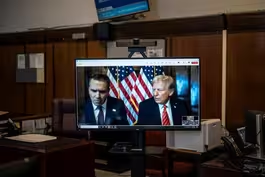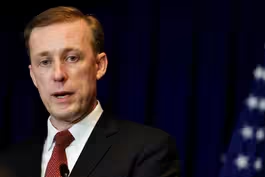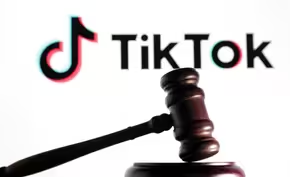
Brooks and Capehart on Trump's sentencing and his 2nd term
Clip: 1/10/2025 | 10m 14sVideo has Closed Captions
Brooks and Capehart on Trump's sentencing and what's coming in his 2nd term
New York Times columnist David Brooks and Washington Post associate editor Jonathan Capehart join Geoff Bennett to discuss the week in politics, including President-elect Trump's sentencing in New York, Trump's comments about claiming Greenland and the Panama Canal and the state funeral for President Carter.
Problems playing video? | Closed Captioning Feedback
Problems playing video? | Closed Captioning Feedback
Major corporate funding for the PBS News Hour is provided by BDO, BNSF, Consumer Cellular, American Cruise Lines, and Raymond James. Funding for the PBS NewsHour Weekend is provided by...

Brooks and Capehart on Trump's sentencing and his 2nd term
Clip: 1/10/2025 | 10m 14sVideo has Closed Captions
New York Times columnist David Brooks and Washington Post associate editor Jonathan Capehart join Geoff Bennett to discuss the week in politics, including President-elect Trump's sentencing in New York, Trump's comments about claiming Greenland and the Panama Canal and the state funeral for President Carter.
Problems playing video? | Closed Captioning Feedback
How to Watch PBS News Hour
PBS News Hour is available to stream on pbs.org and the free PBS App, available on iPhone, Apple TV, Android TV, Android smartphones, Amazon Fire TV, Amazon Fire Tablet, Roku, Samsung Smart TV, and Vizio.
Providing Support for PBS.org
Learn Moreabout PBS online sponsorshipGEOFF BENNETT: From a day of remembrance for President Carter to president-elect Trump being sentenced in court, we turn now to the analysis of Brooks and Capehart.
That's New York Times columnist David Brooks, and Jonathan Capehart, associate editor for The Washington Post.
It's good to see you both on this Friday.
JONATHAN CAPEHART: Geoff.
GEOFF BENNETT: So president-elect Donald Trump received the first ever criminal sentence for a former or incoming American president, a so-called unconditional discharge in his criminal hush money case.
David, we are living in this era where the word unprecedented has been worn down to a cliche.
Still, what should we make of the fact that Donald Trump will be the first president to take office with a criminal conviction?
DAVID BROOKS: Well, I thought it was the right solution.
Trump wanted the whole thing wiped out, the court and trial wiped out.
Some of his opponents want him to go to jail.
But in our country, we respect the will of voters.
The presidency, under the Constitution, at least as interpreted by the Supreme Court, has protections.
We do not want to live in a society where presidents face possible prosecution for the things they do while in office or even in the periphery of their office.
And so I thought, convicting him, making him a felon, I think he can't own a gun.
There are a few restrictions there.
But not sending him to jail, that struck me as a balance between the needs of the legal system and the needs of our democracy.
GEOFF BENNETT: Donald Trump is vowing to appeal this conviction.
We will see what comes of that.
But after being convicted of 34 felonies, there are people who look at this case and they say that Donald Trump walks away with a punishment that is less than what one would receive for a speeding ticket.
JONATHAN CAPEHART: Look, this case, this hush money case, was the case that everybody said was the crappy case of the four.
Remember, Donald Trump was indicted four times, and this one was the least important, the shakiest.
And yet it's the one case where Donald Trump was held accountable, the one case where he was brought to trial before a jury of his peers in his hometown of New York City and was found guilty 34 times.
I think that is great punishment.
What's also great punishment is the sentencing today, where the judge said, you're going to be president, you're not going to go to jail, but you're a convicted felon.
And so for the rest of his life, any story written about him will have to mention the fact that he's a convicted felon, if not on the first reference, definitely by the second reference.
And that is fitting, that is right, that is just.
Do I wish the other three cases had gone to trial and that he had faced accountability on those?
Yes, but this will do.
GEOFF BENNETT: It's also striking the proximity of the sentencing and the inauguration, that, on January 10, Donald Trump is a defendant subject to a judge and a jury verdict, and 10 days from now, he will in many ways become The Guardian of the nation's laws, as he assumes all the powers of the presidency.
How does that strike him?
DAVID BROOKS: Odd.
DAVID BROOKS: Yes, I mean, he is a precedent-setter in all sorts of bad ways.
And so he's, I think, probably guilty on all these four different cases.
He's someone who doesn't respect the law.
And so I guess it makes me think, if he's someone who regards the presidency as a piece of personal property, and is not willing to abide by the code of ethics and the code of law we surround the presidency with, what's coming in the second term?
And so we shall see.
JONATHAN CAPEHART: But -- and to that point, keep in mind who's going into the Justice Department with him in this second term, the lawyer who was in court with him today for his sentencing.
All of his personal lawyers are in the top positions of the Justice Department.
GEOFF BENNETT: There was that rare show of independence yesterday from the Supreme Court, where we saw the chief justice, John Roberts, and Amy Coney Barrett side with the liberals in that ruling that allowed the sentencing to move forward.
It is a risk to read too closely into any one Supreme Court ruling.
That won't stop me from asking the question.
What can we learn, if anything, about the way the court ruled in this case and what it suggests about other cases involving Donald Trump?
DAVID BROOKS: Well, I think John Roberts, somebody once said to me, he could have been the greatest Supreme Court chief justice or one of the greats in history if he only had a court behind him.
And he does not.
So he's sort of a lone operator.
Amy Coney Barrett has repeatedly shown some distance sometimes between her and Donald Trump.
I think if not -- if the Kavanaugh hearings had not gone the way the hearings, Brett Kavanaugh may have shown some difference.
But especially with Coney Barrett and Roberts, you have justices who are quite willing to not toe the Trump line every single time.
GEOFF BENNETT: Well, in addition to vowing to make good on his campaign promise to make America great again, he also, apparently, the president-elect, wants to make America bigger.
He has talked about obtaining Greenland from Denmark.
He wants to reclaim the Panama Canal from Panama.
He wants to turn Canada into the 51st state.
This is in addition to wanting to rename the Gulf of Mexico.
It's not clear how serious he is about any of these things.
Of course, he talked about trying to take Greenland in the first administration.
What should we make of any of this, Jonathan?
JONATHAN CAPEHART: I'm just -- this -- look, I'm going to take a page out of Rachel Maddow's book from the first Trump term, which was, don't listen so much to what they say.
Pay attention to what they do.
So he can talk all sorts of smack about Greenland and Gulf of America and making Canada the 51st state.
But until he actually does something, if he does try to take Greenland, if he does try to rename the Gulf of Mexico, if he does try to act on these things he's talking about, then I will take him seriously.
This is the thing I learned from the first Trump term.
We will drive ourselves crazy if we react to everything that he says.
I'm going to pay attention to what he does.
GEOFF BENNETT: The outgoing Canadian Prime Minister Justin Trudeau in an interview said that this is all a distraction.
Take a listen to what he said.
JUSTIN TRUDEAU, Canadian Prime Minister: President Trump, who's a very skillful negotiator, is getting people to be somewhat distracted by that conversation to take away from the conversation around 25 percent tariffs on oil and gas and electricity and steel and aluminum and lumber and concrete.
GEOFF BENNETT: There are plenty of reasons for the U.S. to be interested in Greenland, for instance, given all of the mineral resources there and the fact that China dominates rare earth mineral production.
But is this a distraction?
DAVID BROOKS: Well, the talk of invading Greenland is a distraction, like invading Quebec.
Are we going to invade Quebec?
No, I don't think so.
And it should be said that Greenland is super more important because of climate change and because a lot of the navigational lanes that go through there.
But Denmark, which has strong influence and co-ownership on Greenland, they have been wonderful to the U.S.
They have made sure all our interests are protected.
And so we have no beef with Greenland.
Same with Panama, frankly.
Of course it would be a problem if the U.S. couldn't use the Panama Canal.
But Panama has operated completely professionally, no bias toward China, no bias away from the U.S.
So, as usual, there's no problem here.
Justin Trudeau is absolutely right, though.
These things are to the side.
The tariffs are real.
The tariff proposal, that's an actual proposal.
And declaring a trade war on our two closest allies and neighbors is a cataclysmic policy.
And whether we actually go ahead and impose tariffs on Canada, which one of our main allies in trading, that really was -- there's a reason Justin Trudeau on the way out is confronting that, because that really is the catastrophe in front of us.
GEOFF BENNETT: I want to wrap up our conversation with your reflections on the state funeral yesterday for the late President Jimmy Carter.
Some historians have argued, Jonathan, that Carter was misunderstood and underappreciated.
How do you see it?
JONATHAN CAPEHART: Well, that's the beauty of being out of the White House and having time and history build up around you and change the way people look at your presidency.
And he lived to 100 years old, so he got to see 40 years' worth of reinterpretation of his presidency while he was still alive.
I think the funeral yesterday is like Washington's version of a "Real Housewives" reunion, hearkening back to -- or also hearkening back to a more genteel time, even though Donald Trump was there.
JONATHAN CAPEHART: But you have all these people who are upholding institutions, upholding civility, and honoring a former president who, when he left Washington, was reviled, was not popular at all.
And yet, there in the National Cathedral, we saw official Washington and all of his living predecessors be there to honor him in that way.
GEOFF BENNETT: That's right, the five current former presidents all there to honor one of their own.
Lots of interactions to parse.
We have a sort of an assemblage of them here.
We have Mike Pence and Donald Trump, Trump and Obama.
There was George W. Bush as he greeted the former president.
There, you see it right there.
GEOFF BENNETT: How does all of that strike you?
DAVID BROOKS: Boom.
JONATHAN CAPEHART: Yes.
DAVID BROOKS: It was like watching one of these Russian novels.
Like, oh, there's Count Vronsky's at the ball, and so is Count Volkovsky, and there's Anna Karenina.
She's also here.
So it was like 30 years of our political lives in one room.
And you think of all the drama between them, and I'm just talking about the Clintons, the Obamas, all the internecine, the Pence -- it really was.
It was like a dramatic novel.
But there is, as Jonathan said, a bit of nostalgia as we look back.
And I try to think, I think about this all the time, was the 70s worse or better than now?
And I would say, on matters of crime, of divorce rates, of societal breakdown, the '70s were worse.
But they did have Republican senators who would go to Richard Nixon in the '70s and say, you need to resign.
They did have a political leadership class that is better than our class right now.
GEOFF BENNETT: David Brooks and Jonathan Capehart, thanks, as always.
JONATHAN CAPEHART: Thanks, Geoff.
Climate created 'perfect storm' for fires, researcher says
Video has Closed Captions
Clip: 1/10/2025 | 4m 58s | Warming climate created 'perfect storm' for catastrophic fires, NASA researcher says (4m 58s)
How Trump avoided punishment for his felony convictions
Video has Closed Captions
Clip: 1/10/2025 | 5m 31s | How Trump avoided punishment for his felony convictions (5m 31s)
Jake Sullivan reflects on Biden's foreign policy legacy
Video has Closed Captions
Clip: 1/10/2025 | 10m 8s | Jake Sullivan on Biden’s foreign policy legacy and the state of U.S. allies and enemies (10m 8s)
LA reflects wildfire destruction while looking to future
Video has Closed Captions
Clip: 1/10/2025 | 7m 43s | LA reflects on what wildfires have destroyed while looking to prepare for future disasters (7m 43s)
TikTok's future now in hands of Supreme Court
Video has Closed Captions
Clip: 1/10/2025 | 7m | TikTok's future in hands of Supreme Court as justices hear arguments against ban (7m)
Providing Support for PBS.org
Learn Moreabout PBS online sponsorship
- News and Public Affairs

FRONTLINE is investigative journalism that questions, explains and changes our world.

- News and Public Affairs

Amanpour and Company features conversations with leaders and decision makers.












Support for PBS provided by:
Major corporate funding for the PBS News Hour is provided by BDO, BNSF, Consumer Cellular, American Cruise Lines, and Raymond James. Funding for the PBS NewsHour Weekend is provided by...





